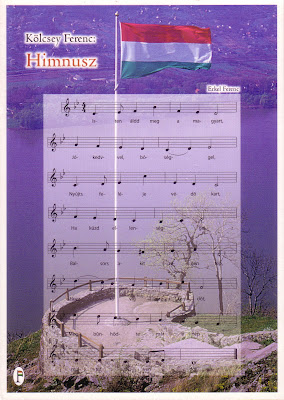

"Himnusz" (in English: Hymn) - the song beginning with the words Isten, áldd meg a magyart (God, bless the Hungarians) - is the official national anthem of Hungary. It was adopted in 1844 and the first stanza is sung at official ceremonies. The words were written by Ferenc Kölcsey, a nationally renowned poet in 1823, and the now-official music was composed by romantic composer Ferenc Erkel, although other less-known musical versions exist. The poem had the subtitle "A magyar nép zivataros századaiból" ("From the rough centuries of the Hungarian people"); it is often argued that this subtitle was only added so that the poem passes Habsburg censorship, by emphasizing past rather than present national grievances.
The poem and song titled "Szózat", which starts with the words Hazádnak rendületlenül légy híve, óh magyar (To your homeland be faithful steadfastly, O Hungarian) enjoys a social status nearly equal to that of "Himnusz", even though only "Himnusz" is mentioned in the Constitution of Hungary. Traditionally, Himnusz is sung at the beginning of ceremonies, and Szózat at the end.
Recognition is also given to the Rákóczi March, a short wordless piece (composer unknown, but sometimes attributed to János Bihari) which is often used on state military occasions; and the poem Nemzeti dal written by Sándor Petőfi.
The official radio station Kossuth Rádió plays Himnusz every day at ten past midnight when broadcast on AM bands ends, and so do the state TV channels at the end of the daily broadcast. Himnusz is also traditionally played on Hungarian television at the stroke of midnight on New Years Eve. Even in private homes, people will stand and sing along at that time.
The words of the Hungarian anthem are unusual for the genre in expressing a direct plea to God rather than proclaiming national pride. Because of the mention of God, the anthem was played but the words were not sung during the period of the strongest Communist rule in Hungary (1949–1956). (Party Secretary Mátyás Rákosi even asked composer Zoltán Kodály to write a new, Communist-themed national anthem, but Kodály refused, and Rákosi didn't press the matter.) After the fall of the Hungarian Revolution, János Kádár attempted to replace the Himnusz with Szózat as the national anthem, but failed.
The poem and song titled "Szózat", which starts with the words Hazádnak rendületlenül légy híve, óh magyar (To your homeland be faithful steadfastly, O Hungarian) enjoys a social status nearly equal to that of "Himnusz", even though only "Himnusz" is mentioned in the Constitution of Hungary. Traditionally, Himnusz is sung at the beginning of ceremonies, and Szózat at the end.
Recognition is also given to the Rákóczi March, a short wordless piece (composer unknown, but sometimes attributed to János Bihari) which is often used on state military occasions; and the poem Nemzeti dal written by Sándor Petőfi.
The official radio station Kossuth Rádió plays Himnusz every day at ten past midnight when broadcast on AM bands ends, and so do the state TV channels at the end of the daily broadcast. Himnusz is also traditionally played on Hungarian television at the stroke of midnight on New Years Eve. Even in private homes, people will stand and sing along at that time.
The words of the Hungarian anthem are unusual for the genre in expressing a direct plea to God rather than proclaiming national pride. Because of the mention of God, the anthem was played but the words were not sung during the period of the strongest Communist rule in Hungary (1949–1956). (Party Secretary Mátyás Rákosi even asked composer Zoltán Kodály to write a new, Communist-themed national anthem, but Kodály refused, and Rákosi didn't press the matter.) After the fall of the Hungarian Revolution, János Kádár attempted to replace the Himnusz with Szózat as the national anthem, but failed.
* O, my God, the Magyar bless
With Thy plenty and good cheer!
With Thine aid his just cause press,
Where his foes to fight appear.
Fate, who for so long did’st frown,
Bring him happy times and ways;
Atoning sorrow hath weighed down
Sins of past and future days.
* integral - click here



.jpg)


























No comments:
Post a Comment